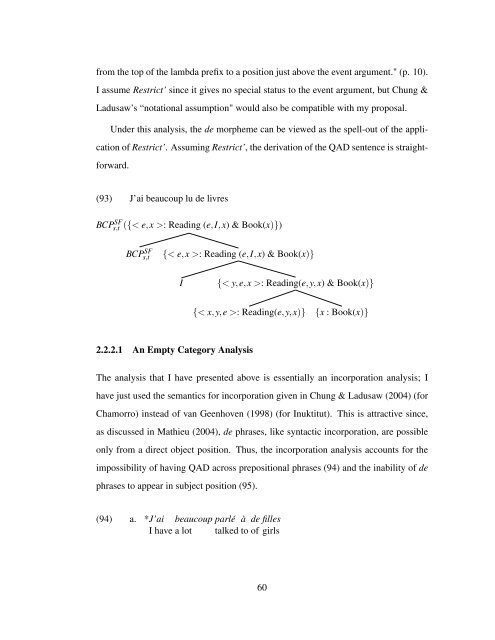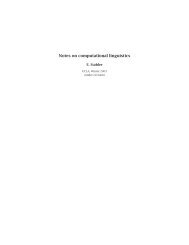Formal Approaches to Semantic Microvariation: Adverbial ...
Formal Approaches to Semantic Microvariation: Adverbial ...
Formal Approaches to Semantic Microvariation: Adverbial ...
You also want an ePaper? Increase the reach of your titles
YUMPU automatically turns print PDFs into web optimized ePapers that Google loves.
from the <strong>to</strong>p of the lambda prefix <strong>to</strong> a position just above the event argument." (p. 10).<br />
I assume Restrict’ since it gives no special status <strong>to</strong> the event argument, but Chung &<br />
Ladusaw’s “notational assumption" would also be compatible with my proposal.<br />
Under this analysis, the de morpheme can be viewed as the spell-out of the application<br />
of Restrict’. Assuming Restrict’, the derivation of the QAD sentence is straightforward.<br />
(93) J’ai beaucoup lu de livres<br />
BCP SF<br />
s,t ({< e,x >: Reading (e,I,x) & Book(x)})<br />
BCP SF<br />
s,t<br />
{< e,x >: Reading (e,I,x) & Book(x)}<br />
I<br />
{< y,e,x >: Reading(e,y,x) & Book(x)}<br />
{< x,y,e >: Reading(e,y,x)}<br />
{x : Book(x)}<br />
2.2.2.1 An Empty Category Analysis<br />
The analysis that I have presented above is essentially an incorporation analysis; I<br />
have just used the semantics for incorporation given in Chung & Ladusaw (2004) (for<br />
Chamorro) instead of van Geenhoven (1998) (for Inuktitut). This is attractive since,<br />
as discussed in Mathieu (2004), de phrases, like syntactic incorporation, are possible<br />
only from a direct object position. Thus, the incorporation analysis accounts for the<br />
impossibility of having QAD across prepositional phrases (94) and the inability of de<br />
phrases <strong>to</strong> appear in subject position (95).<br />
(94) a. *J’ai beaucoup parlé à de filles<br />
I have a lot talked <strong>to</strong> of girls<br />
60
















